Servant of the Bones Read online
Page 5
" 'My powers!' I said sarcastically. 'What powers! You smiled. You are the god!'
"Silence, but I knew he was still there. I could always feel him, like heat; I heard him like breath. You know, the way a blind person knows that someone is there.
"I got to my front door and was ready to go in, and I turned around and for the first time I actually laid eyes on him. I saw Marduk. Not the gold statuette in my room. Not the big statues in the temple. But Marduk, himself.
"He was standing against the far wall, arms folded, one knee bent, just looking at me. It was Marduk. He was completely covered in gold as he was at the shrine but he was alive and his curly hair and beard seemed not made of solid gold as they were on the statue but living gold. His eyes were browner than mine, that is, paler, with more yellow in the irises. He smiled at me.
" 'Ah, Azriel,' he said. 'I knew it would happen. I knew it.' And then he came forward and he kissed me on both cheeks. His hands were so smooth. He was my height, and I was right, there was a great resemblance between us, though his eyebrows were set just a bit higher than mine and his forehead was smoother, so he didn't look so mischievous or ferocious by nature as I did.
"I wanted to throw my arms around him. He didn't wait for me to say it. He said, 'Do it, but for that moment maybe others will see me too.'
"I hugged him as my oldest friend, as the dearest to me in the world next to my father, and it was that night I made the mistake of telling my father that I talked with my god all the time. I should never have done it. I wonder now what would have happened if I had not done that."
I interrupted. "Did anyone else see him, to the best of your knowledge?"
"Yes, as a matter of fact, they did. The doorkeeper of our house saw him and all but fainted dead away to see a man all covered in gold paint, and one of my sisters looking down from the lattice above saw him too, and an elder of the Hebrews got a glimpse of him for a moment and came flying at me later that night with his staff, claiming he had seen me with a devil or an angel, and he did not know which.
"That's when my father, my beloved, sweet, good-hearted father said, 'It was Marduk, Babylon's god, whom you saw.' And maybe that is why...that is why, we are here now. My father never meant to hurt me. Never. He never meant to do a cruel thing to anyone in his life! He never meant it! He was...he was my little brother.
"Let me explain. I have figured it out. I was the eldest son, born when my father was young, because the deportation from Jerusalem had been hard on our people and they married quickly to have sons.
"But my father was the baby of his family, the little Benjamin beloved by everyone, and somehow or other in our family I fell into being his elder brother, and treating him as such. As eldest son I bossed him about a bit. Or rather, we became...we became as friends.
"My father worked hard. But we were close. We drank together. We went to the taverns together. We shared women together. And I told him, drunk that night, how Marduk had talked to me for years, and how now I had seen him, and my personal god was the great god of Babylon himself.
"So foolish to have done it! What good could have come of it! At first he laughed, then he worried, then he became engrossed. Oh, I never should have done it. And Marduk knew this. He was in the tavern but so far from me that he had no visibility, he was vaporous and golden like light, and only I could see him, and he shook his head 'no,' and turned his back when I told my father. But you know, I loved my father, and I was so happy! And I wanted him to know. I wanted him to know how I had put my arms around the god!
"Stupid!
"Let me return to the background. The foreground is suddenly too hot for me and it hurts me and stings my eyes.
"The family. I was telling you what we were. We were rich merchants and we were scribes of our Sacred Books. All of the Hebrew tribes in Babylon were in one way or another scribes of the Sacred Books and busy making copies for their own families at all times, but with us it was a very large business because we were known for the rapid and accurate copy. And we had a huge library of old texts. I think I told you, we had maybe, I don't know, twenty-five different stories about Joseph and Egypt and Moses and so forth, and it was always a matter of dispute what to include and what not to. We had so many stories of Joseph in Egypt that we decided not to give all of them credit. I wonder what became of all those tablets, all those scrolls. We just didn't think all those stories were true. But maybe we were wrong. Oh, who knows?
"But to return to the fabric of my life. Whenever I left the court of the palace, or the tablet house, or the marketplace, I came right home to work all evening on the Holy Scriptures, with my sisters and my cousins and uncles in the scriptoria of our houses, which were big rooms.
"As I told you, I was never very quiet, and I would sing the psalms out loud as I wrote them, and this irritated my deaf uncle more than anyone. I don't know why. He was deaf! And besides, I have a good voice."
"Yes, you do."
"Why should a deaf uncle get so upset? But he knew I was singing the psalms not as I just sang that one for you, but as one would sing, with cymbals, dancing, you know, with a little bit of added dash, shall we say, and he wasn't so happy about it.
"He said that we were to write when we were to write and to sing the Lord's songs at the appropriate time. I shrugged and gave in but I was one for cutting up all the time. But I'm giving the wrong impression. I wasn't really bad..."
"I know what kind of man you are, and were then..."
"Yes, I think by now you do, and maybe if you thought me bad you would have thrown me out in the snow."
He looked at me. His eyes weren't ferocious. The brows were low and thick, but the eyes were plenty big enough beneath them to give him a pretty look. And, it seemed to me that he was warmer and more relaxed now than earlier, and I felt drawn to him and wanting to hear everything he said.
But I wondered: Could I throw him out in the snow?
"I've taken many lives," he said, plucking the thought right from me, "but I would not hurt you, Jonathan Ben Isaac, you know that. I wouldn't hurt such a man as you. I killed assassins. At least when I came to myself that was my code of honor. That is my code now.
"In my early days as the Servant of the Bones, as the bitter, angry ghost for the powerful sorcerer, I killed the innocent because it was my Master's will and I thought I had to do it, I thought that the man who had called me up could control me, and I did his bidding, until the moment came when I suddenly realized that I did not have to be a slave forever, that maybe though my soul had been taken from my spirit, and my spirit and soul from my flesh, that perhaps I could still be pleasing to God. That somehow all could come and be united once more in one figure! Ah!"
He shook his head.
"But Azriel, maybe it's happened!"
"Oh, Lord God, Jonathan, don't give me consolation. I cannot bear it. Just hear me out. Make sure your tapes record my words. Remember me. Remember what I say..."
His confidence broke suddenly. He looked at the fire again.
"My family, my father," he said. "My father! How it hurt him what he finally did, and how he looked at me. Do you know what he said about hurting me? He said, 'Azriel, who of all my sons loves me as you do? No one else could ever forgive me for this but you!' And he meant it. He meant it, my father, my little brother, looking at me full of tears and sincerity and absolute conviction!
"I'm sorry. I jump ahead. I'll die soon enough. It won't take too many more pages, I don't think." He shuddered all over. And again the tears stood in his eyes. "Forgive me, and recall again that for those thousands of years, I didn't remember these things. I was the bitter ghost without memory. And now it has all come back to me and I pour it out to you. I pour it out to you in tears."
"Continue. Give me your tears, your trust, and your hurt. I won't fail you."
"Ah, you are the rare thing, Jonathan Ben Isaac," he said.
"Not really, I'm a teacher and a happy man myself. I have a wife and children who love me. I'm not very s
pecial."
"Ah, but you are a good man who will talk to someone who is evil! That is what is rare. The Rebbe of the Hasidim, he turned his back on me!" He laughed suddenly, a deep bitter laugh. "He was too good to talk to the Servant of the Bones."
I smiled. "We are all Jews, and there are Jews, and there are Jews."
"Yes, and now Israelis, who would be Maccabees! And there are Hasidim."
"And other Orthodox, and some 'reformed,' and so on it goes. Let's go back to your time. You were a big and happy family."
"Yes, true, and it was regular--I was explaining--it was regular for the rich Hebrews to work at the palace as I said, my father worked there too, and many of my cousins. We were scribes, but also merchants, merchants of jewels, silks, silver, and books. My father's gift in trade was choosing the very finest vessels for the King's table and for the Table of the Gods in Marduk's temple and for Marduk himself.
"Now at the time, the temple was full of chapels, and every day a meal was set out for each deity, including Marduk, so the temple had a huge stock of gold and silver vessels for this. And my father was the one who put aside those vessels not fit.
"I went down with him to the docks all the time to meet the ships coming in from the sea, with the finest new work from Greece or Egypt, and I learned from him how to judge the carving on a goblet, and how to know the heaviest and finest mixture of gold. I learned to know a true ruby or diamond and pearls--pearls, I loved the pearls, we dealt in pearls of all kinds, we didn't call them pearls, you know, we called them eyes of the sea.
"This is how we made our living--in the marketplace and in the temple and in the palace.
"My family had stalls all through the marketplace where they dealt in gems of all kinds, in honey, and in cloth dyed purple and blue, the finest of all silk and linen, and they sold the incense too, though they sold it to idolaters who would burn this incense for Nabu and Ishtar, and for Marduk, of course.
"But it was our living, it was our source of power, it was our way of staying together, of being strong so that one day we could go home. It was as important as the copying of the Sacred Books."
"It's an old tale," I said.
"This whole trade, by the way, gave to my own house a sumptuous quality that it might not have had, had we been camel breeders. And that you must understand because the richness around us colored my father's values as much as mine.
"What I mean is, not only did we make money, but the house was always full of merchandise passing through. You know. Here would be a magnificent cedar statue of the goddess Ishtar just come from Dilmun, and my uncle would keep it at home for a week or two, gracing the living room, before the sale was made. The place was full of beautiful footstools, delicate furniture from Egypt, the fine black and red urns and pots of the Greeks, and just about anything portable and ornamental and lovely to behold."
"You grew up on beauty, didn't you?"
"Yes," Azriel said. "I did. I really did. And I grew up, for all my smart talking and carrying on and flirting with Marduk, I grew up with love. My father's love. The love of my brothers. My sisters. The love of my uncles even. Even my deaf uncle. Even once the prophet Azarel said to me, 'Yahweh looks at you with love.' So did the old witch Asenath. Ah, such love."
He had come to a natural pause. He sat there, resplendent in the red velvet, hair glossy and natural, and the pure skin of his young man's cheeks as soft as a girl's I suppose. I must be getting old. Because young men look to me now as beautiful as girls. Not that I desire them. It's only that life itself is lush.
He was confused. In pain. I hesitated to press him. Then he parted his lips, only to be quiet.
3
What was it like, roaming in the temple? The palace?" I asked. "The beautiful house, I can envision. But the palace, was the palace plated in gold? Was the temple?"
He didn't respond.
"Give me pictures, Azriel. Take your time by means of images. The temple, will you tell me what that was like?"
"Yes," he said. "It was a house of gems and gold. It was a world of the deep vibrant gleam of the precious, of lovely scents and the sounds of harps, and pipes playing; it was a world for the bare feet to walk on smooth tiles that were themselves cut in the shapes of flowers." He smiled.
"And," he said, "it was a hell of a lot more fun than you might think. Not all that solemn. The two buildings were huge, of course, you know Nebuchadnezzar built the palace to the full glory of the past, or so he thought, and greatly expanded the private gardens; and the temple was the great building known as Esagila, and behind the building itself stood the big ziggurat, Etemenanki, with its stairway to heaven, and then its ramps going up to the very topmost temple of my great and favorite smiling god.
"The temple and the palace were full of locked and sealed doors. Some of these seals had not been broken in a hundred years. And of course, as you probably know, we had contracts made in this way too...in that a contract would be written out on a clay tablet, dried, and then enclosed in a clay envelope with the same words on it, which was then dried, so that one could not get to the original tablet inside without breaking the envelope. So if some corrupt individual had made a change on the outer envelope, the sealed inside tablet would tell the truth.
"There was a lot of that at court, people bringing in contracts, breaking open the envelopes, discovering some wily bastard had made a change in the contract, and the King and his advisors and wise men passing judgment. I never followed out any condemned man to see him executed. As you said, I grew up on beauty.
"In the streets of Babylon I never saw the hungry. I never saw a wretched slave. Babylon was the city people dreamed of living in; everyone was happy in Babylon and under the protection of the King.
"But to return to your question. One could roam in the temple. One could just roam. I could creep in my fine jeweled slippers into the chapels where the other gods were--Nabu and Ishtar and any god or goddess who had been brought from another city for sanctuary.
"You know, that was happening. Cyrus the Persian was on the march most definitely, taking the Greek cities along the coast one after another. And so from all over Babylonia, frightened priests were sending their gods to us for protection, to the great gateway, and we had set up these visiting deities in chapels and these chapels were full of twinkling light.
"This fear for the god, that the enemy would get him, it was very real. Marduk himself had for two hundred years been a prisoner in another city, stolen and taken there, and it had been a great day for Babylon, long before my birth, when Marduk had been recovered and had been brought home."
"Did he ever tell you about it?" I asked.
"No," he said. "But I didn't ask him. We'll come to such things...
"As I was saying, I liked roaming about the temple. I took messages to the priests; I waited at table when Belshazzar dined, and I made friends of all the palace crowd, you might say, the eunuchs, the temple slaves, the other pages, and some of the temple prostitutes who were, of course, beautiful women.
"Now all of this work I did in the temple and the palace, there was a Babylonian point to it. The government had a sensible policy. When rich hostages like us, rich deportees, were brought in not only to enhance the culture, young men like me were always, picked out to be trained in Babylonian ways. That was so that if or when we were sent back to our own city or some distant province we would be good Babylonians, that is, skilled members of the King's loyal service.
"There were scores of Hebrews at court.
"Nevertheless, I had uncles who went into a fury that my father and I worked at the temple, but my father and I, we would shrug our shoulders and say, 'We don't worship Marduk! We don't eat with the Babylonians. We don't eat the food that the gods have eaten.' And a good deal of the community felt the same way as we did.
"Let me note here, this eating of food. It's still important for the Hebrews. No? You don't eat with heathens. You didn't then. And you didn't eat anything ever that had once been put before an idol.
It was a big thing.
"As good Hebrews, we broke bread only with one another, and our hands were always washed carefully with ritual prayer before we took the food, and afterwards there was not one thing in our lives that was not permeated by our desire to praise Yahweh, our Lord God of Hosts.
"But we had to survive in Babylon. We had every intention of returning rich to our homeland. We had to be strong. And that meant what it has always meant to the Hebrews. You must be powerful enough to disperse without being destroyed."
Again came one of the inevitable pauses. He leant forward and stirred the fire, as people do when they want to think, and want to have the feeling of doing something. Stirring fires can give you that feeling, especially if you aren't drinking anything, clutching your coffee as if that were a full-time job, the way I was doing.
"You looked then exactly as you look now, didn't you?" I said, though this was a repeat question. It was one of those soft verbal signals: God gave you all the right gifts, young man.
"Yes," he said. "I wanted now to be smooth-faced. I think I told you. But it doesn't seem to be in my luck.
"I came as myself this time, and I don't know even to this moment who called me. Why now? Why has my body come back around me? Why? I don't know.
"In the past when I was called forth by sorcerers, they made me look the way they wanted, and that could be quite horrible. Seldom if ever did they wait, or take a deep breath, to see what I might look like on my own. I would be summoned in a specific form: 'Azriel, Servant of the Golden Bones which I hold in my hand, come forth in a blaze of fire and consume my enemies. Make of them cinders.' That sort of chant.
"Whatever the case, in answer to your question I looked exactly the same when I died as I do now except for one salient characteristic which had been added to me before my murder, which I will recount later. I am as I died."
"Your father, why was it a mistake to tell him about Marduk? Why? What did all that mean? What did he do to you, Azriel?"
He shook his head. "This is the hardest part for me to tell you, Jonathan Ben Isaac, but I have never told anyone, you know. I never told any master. Does God never forget? Will God deny me forever the Stairway to Heaven?"

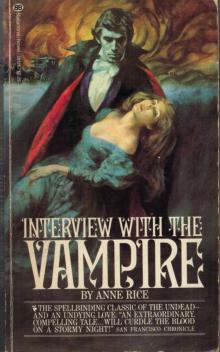 Interview with the Vampire
Interview with the Vampire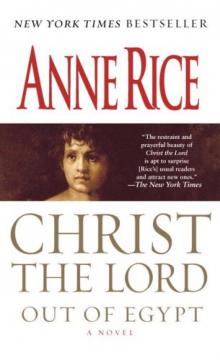 Christ the Lord: Out of Egypt
Christ the Lord: Out of Egypt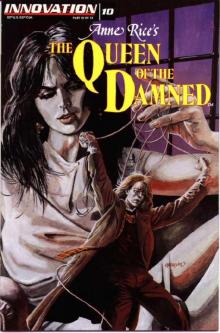 The Queen Of The Damned
The Queen Of The Damned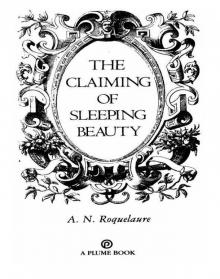 The Claiming of Sleeping Beauty
The Claiming of Sleeping Beauty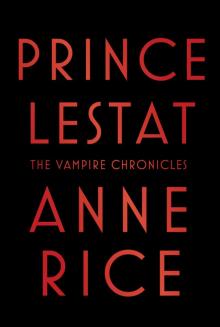 Prince Lestat
Prince Lestat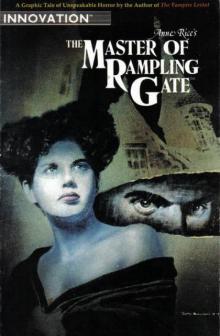 The Master of Rampling Gate
The Master of Rampling Gate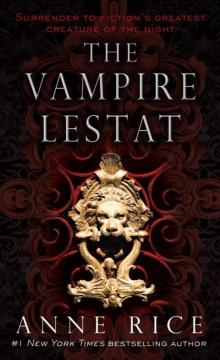 The Vampire Lestat
The Vampire Lestat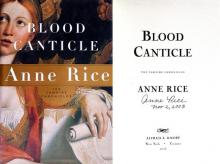 Blood Canticle
Blood Canticle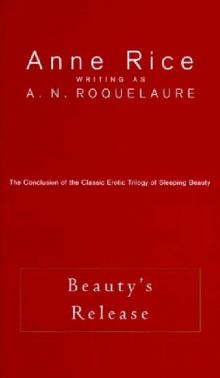 Beauty's Release
Beauty's Release Pandora
Pandora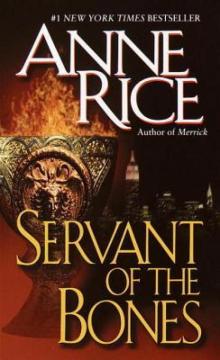 Servant of the Bones
Servant of the Bones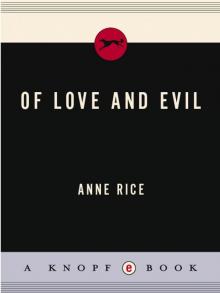 Of Love and Evil
Of Love and Evil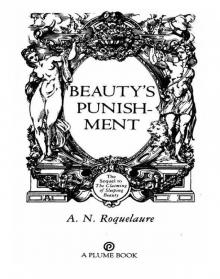 Beauty's Punishment
Beauty's Punishment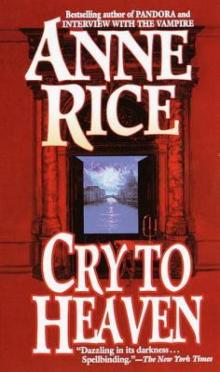 Cry to Heaven
Cry to Heaven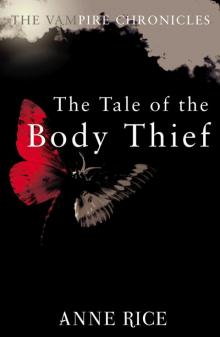 The Tale of the Body Thief
The Tale of the Body Thief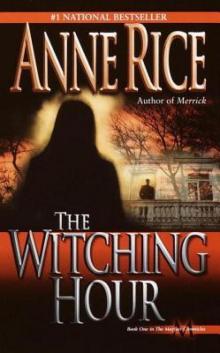 The Witching Hour
The Witching Hour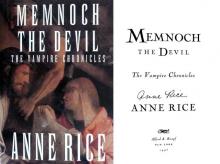 Memnoch the Devil
Memnoch the Devil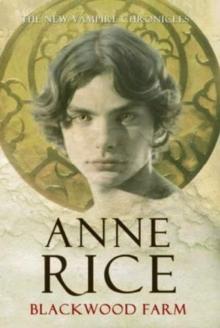 Blackwood Farm
Blackwood Farm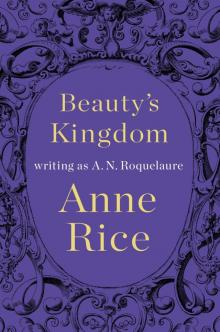 Beauty's Kingdom
Beauty's Kingdom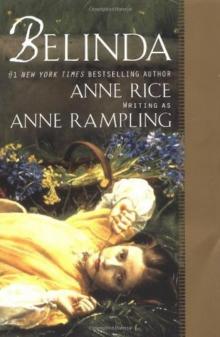 Belinda
Belinda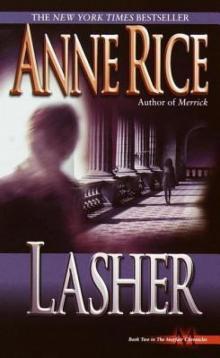 Lasher
Lasher Vittorio, the Vampire
Vittorio, the Vampire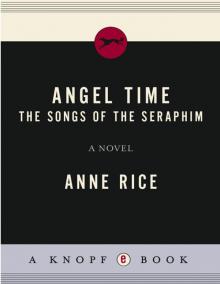 Angel Time
Angel Time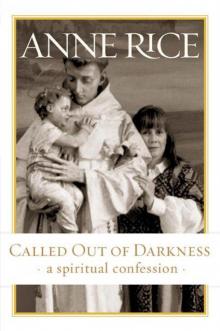 Called Out of Darkness: A Spiritual Confession
Called Out of Darkness: A Spiritual Confession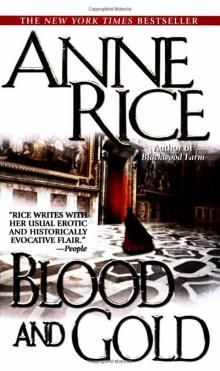 Blood And Gold
Blood And Gold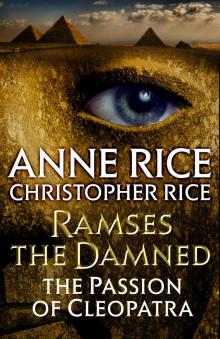 The Passion of Cleopatra
The Passion of Cleopatra Taltos
Taltos Exit to Eden
Exit to Eden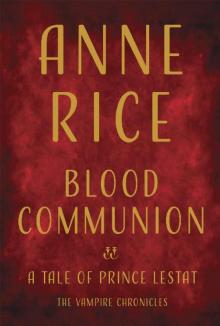 Blood Communion (The Vampire Chronicles #13)
Blood Communion (The Vampire Chronicles #13) The Wolf Gift
The Wolf Gift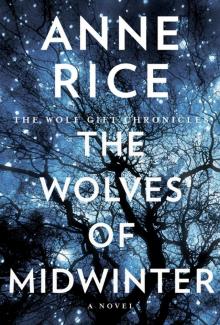 The Wolves of Midwinter
The Wolves of Midwinter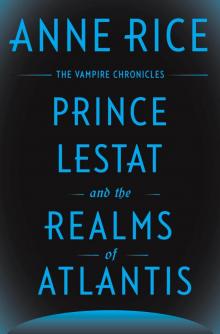 Prince Lestat and the Realms of Atlantis
Prince Lestat and the Realms of Atlantis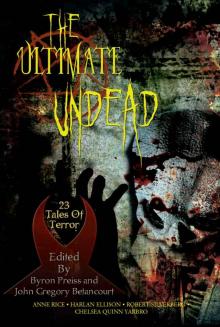 The Ultimate Undead
The Ultimate Undead The Vampire Lestat tvc-2
The Vampire Lestat tvc-2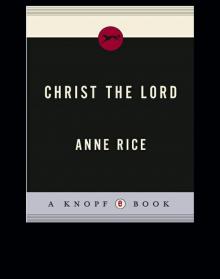 The Road to Cana
The Road to Cana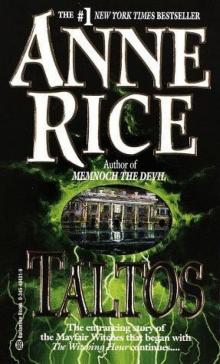 Taltos lotmw-3
Taltos lotmw-3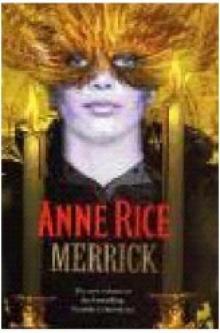 Merrick tvc-7
Merrick tvc-7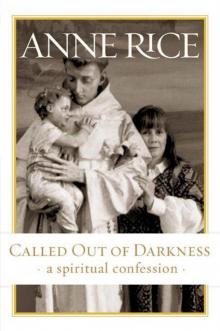 Called Out of Darkness
Called Out of Darkness Pandora - New Vampires 01
Pandora - New Vampires 01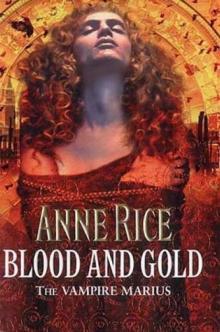 Bllod and Gold
Bllod and Gold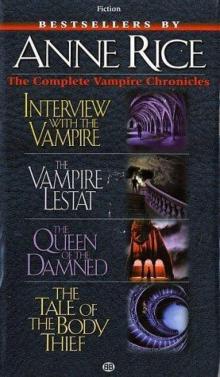 The Queen Of the Damned: Vampire Chronicles
The Queen Of the Damned: Vampire Chronicles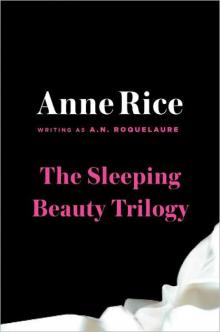 The Sleeping Beauty Trilogy
The Sleeping Beauty Trilogy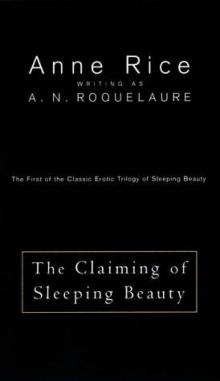 The Claiming of Sleeping Beauty b-1
The Claiming of Sleeping Beauty b-1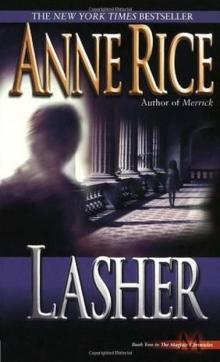 Lasher lotmw-2
Lasher lotmw-2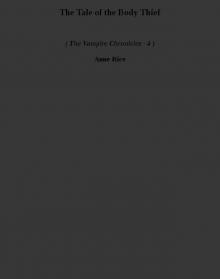 The Tale of the Body Thief tvc-4
The Tale of the Body Thief tvc-4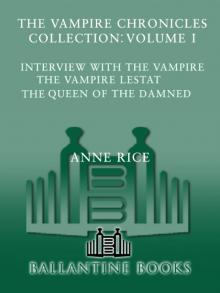 The Vampire Chronicles Collection
The Vampire Chronicles Collection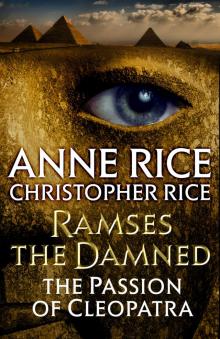 Ramses the Damned
Ramses the Damned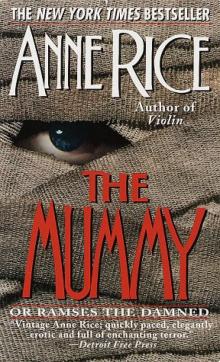 The Mummy - or Ramses the Damned
The Mummy - or Ramses the Damned Vittorio, The Vampire - New Vampires 02
Vittorio, The Vampire - New Vampires 02 The Vampire Armand tvc-6
The Vampire Armand tvc-6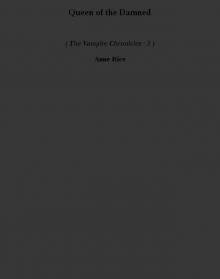 Queen of the Damned tvc-3
Queen of the Damned tvc-3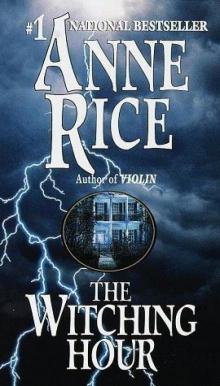 The witching hour lotmw-1
The witching hour lotmw-1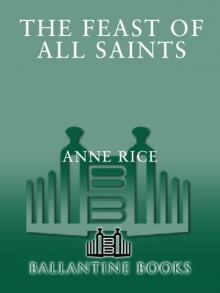 Feast of All Saints
Feast of All Saints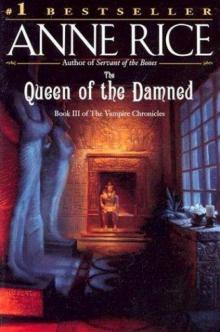 Queen of the Damned
Queen of the Damned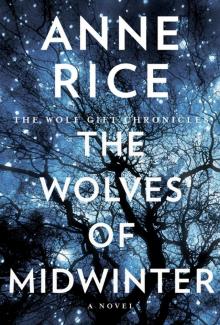 The Wolves of Midwinter twgc-2
The Wolves of Midwinter twgc-2 The Mummy
The Mummy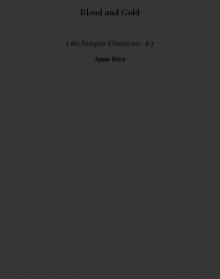 Blood and Gold tvc-8
Blood and Gold tvc-8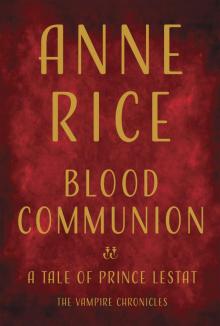 Blood Communion
Blood Communion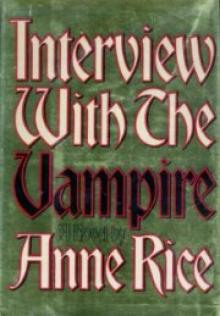 Interview with the Vampire tvc-1
Interview with the Vampire tvc-1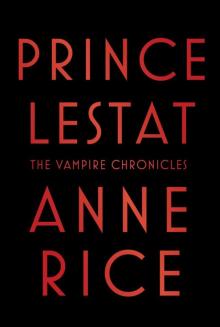 Prince Lestat: The Vampire Chronicles
Prince Lestat: The Vampire Chronicles